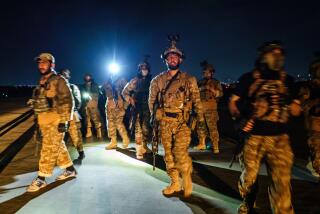A Right to Know, Even in War
- Share via
Americans are dying in the snow-capped mountains of Afghanistan, a reminder that the war there is far from over--and a reminder that even in wartime, information and debate are forces that make democracy strong.
Yes, the initial phase was easier than most observers expected and caused fewer American casualties than feared. But when some Afghan allies proved lackluster at searching Tora Bora’s caves and at stopping Al Qaeda and Taliban fighters from slipping off to Pakistan, it became clear that rooting out the enemy would mean exposing more U.S. ground troops to gunfire and missiles.
Now hundreds if not thousands of fighters are thought to be holed up in labyrinthine caves in Paktia province, and hundreds of regular Army soldiers have joined U.S. Special Operations troops, Afghans and allied nations’ fighters in attacking them. This time U.S. and allied soldiers are closing off potential escape routes. Presumably they will lead the post-battle search of the hide-outs. The security of the United States is tied to the success of such operations. And the security of the U.S. system of government is tied to the public receiving accurate, unvarnished information about such actions, successful or not.
On Jan. 24, U.S. soldiers conducted a predawn raid during which more than a dozen Afghans were killed and 27 captured. The Pentagon at first said those captured were Al Qaeda or Taliban soldiers or sympathizers but then admitted that was wrong. Defense Secretary Donald H. Rumsfeld called the deaths “unfortunate” but said the raid was “no mistake” because Americans fired in self-defense. Rumsfeld should have just called it what it was--a mistake.
Ultimately, such fudging, even in wartime, proves counterproductive. Even more troubling are the White House’s penchant for secrecy--which the war on terrorism has only exacerbated--and Republican sympathizers’ efforts to silence debate. On Sunday, Senate Majority Leader Tom Daschle criticized the administration for not telling Congress it had created a shadow government of 100 senior civilian government managers (only executive branch members need apply). Daschle also challenged the administration for limiting information about its plans for the continued prosecution of the war.
In both cases, he was right. Neither Congress nor the American people can be left out of the loop as President Bush vastly expands U.S. military commitments. And Senate Minority Leader Trent Lott was way off base in demagoguing the issue by asking “how dare” Daschle even raise such concerns.
In fact, Daschle has a duty to do just that. And while no one expects the Pentagon to broadcast its plans during wartime, Americans have a right to be kept abreast of a war in which their sons are dying.
More to Read
Sign up for Essential California
The most important California stories and recommendations in your inbox every morning.
You may occasionally receive promotional content from the Los Angeles Times.













